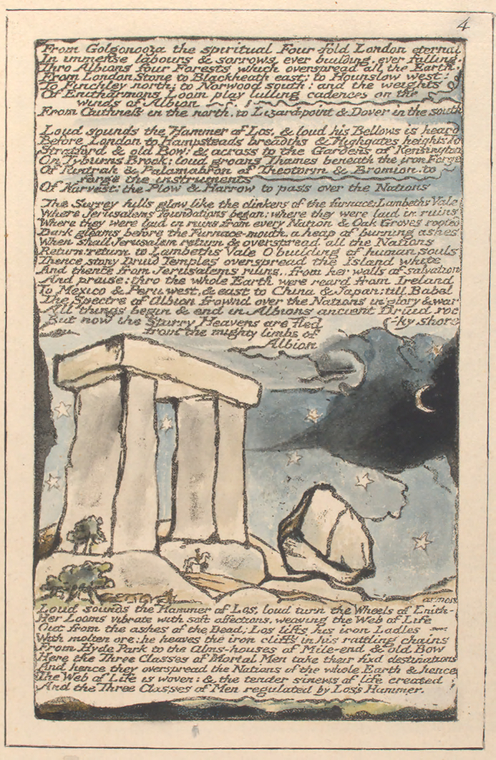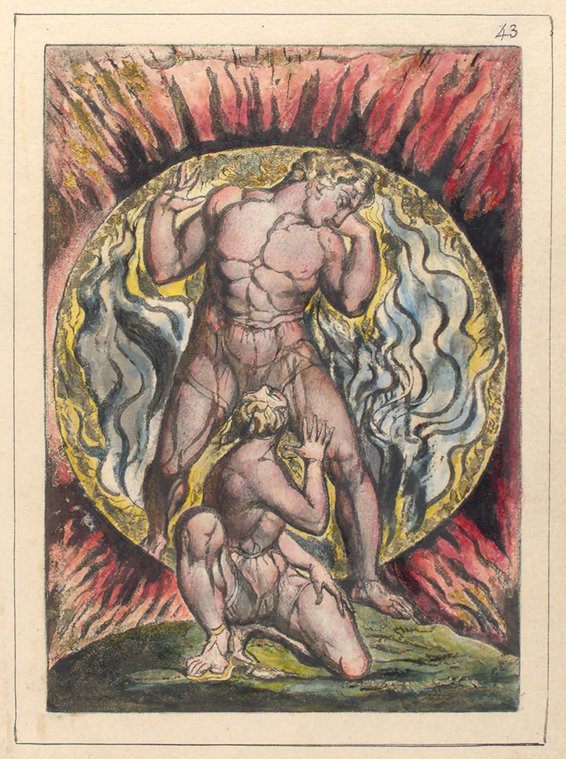Four Zoas, Night VII, Page 79, (E 355)
"Urizen answerd Read my books explore my Constellations
Enquire of my Sons & they shall teach thee how to War
Enquire of my Daughters who accursd in the dark depths
Knead bread of Sorrow by my stern command for I am God
Of all this dreadful ruin"
 |
Wikipedia Commons
Illustration to the Book of Job
Butts Set, Page 12 |
It is not the simple, easy, pleasant things which offer the greatest benefit or prove to be the most worth doing. The world could have been arranged in such a way that there was no variation, no change, no challenge. But without obstacles to be overcome, problems to be solved, unpredictability to be considered, life would indeed be a 'dull round' of repetition.
Descriptive Catalogue, (E 543)
"Mr. B. has done, as all
the ancients did, and as all the moderns, who are worthy of fame,
given the historical fact in its poetical vigour; so as it always
happens, and not in that dull way that some Historians pretend,
who being weakly organized themselves, cannot see either miracle
or prodigy; all is to them a dull round of probabilities and
possibilities; but the history of all times and places, is
nothing else but improbabilities and impossibilities; what we
should say, was impossible if we did not see it always before our
eyes."
Blake puts in the hand of Urizen the plow as the instrument that keeps stirring the events which comprise the complexities of existence. Living as we do in the world of time and space, we learn from demonstration, from experiencing, from seeing the indefinite become definite. It is the reasoning mind which is assigned the task of taking the material which it encounters and defining the value in it whether it be truth or error. Without the labor of Urizen performing the work of breaking up, and turning over the soil comprised of thoughts and actions, there would be no possibility for the work of Los, imagination, to continue.
Milton, Plate 25 [27], (E 121)
"There Los puts all into the Press, the Opressor & the Opressed
Together, ripe for the Harvest & Vintage & ready for the Loom.
They sang at the Vintage. This is the Last Vintage! & Seed
Shall no more be sown upon Earth, till all the Vintage is over
And all gatherd in, till the Plow has passd over the Nations
And the Harrow & heavy thundering Roller upon the mountains
And loud the Souls howl round the Porches of Golgonooza
Crying O God deliver us to the Heavens or to the Earths,
That we may preach righteousness & punish the sinner with death
But Los refused, till all the Vintage of Earth was gatherd in.
And Los stood & cried to the Labourers of the Vintage in voice of awe.
Fellow Labourers! The Great Vintage & Harvest is now upon Earth
The whole extent of the Globe is explored: Every scatterd Atom
Of Human Intellect now is flocking to the sound of the Trumpet
All the Wisdom which was hidden in caves & dens, from ancient
Time; is now sought out from Animal & Vegetable & Mineral- 121 -
The Awakener is come. outstretchd over Europe! the Vision of God is fulfilled
The Ancient Man upon the Rock of Albion Awakes,"
Jerusalem, Plate 29 [33], (E 175)
"Turning his back to the Divine Vision, his Spectrous
Chaos before his face appeard: an Unformed Memory.
Then spoke the Spectrous Chaos to Albion darkning cold
From the back & loins where dwell the Spectrous Dead
I am your Rational Power O Albion & that Human Form
You call Divine, is but a Worm seventy inches long
That creeps forth in a night & is dried in the morning sun
In fortuitous concourse of memorys accumulated & lost
It plows the Earth in its own conceit, it overwhelms the Hills
Beneath its winding labyrinths, till a stone of the brook
Stops it in midst of its pride among its hills & rivers[.]
Battersea & Chelsea mourn, London & Canterbury tremble
Their place shall not be found as the wind passes over[.]
The ancient Cities of the Earth remove as a traveller
And shall Albions Cities remain when I pass over them
With my deluge of forgotten remembrances over the tablet
So spoke the Spectre to Albion. he is the Great Selfhood
Satan: Worshipd as God by the Mighty Ones of the Earth"
Jerusalem, Plate 41 [46], (E 188)
"Thou art in Error Albion, the Land of Ulro:
One Error not remov'd, will destroy a human Soul
Repose in Beulahs night, till the Error is remov'd
Reason not on both sides. Repose upon our bosoms
Till the Plow of Jehovah, and the Harrow of Shaddai
Have passed over the Dead, to awake the Dead to Judgment.
But Albion turn'd away refusing comfort."
Jerusalem, Plate 55, (E 205)
"Every one knows, we are One Family! One Man blessed for ever
Silence remaind & every one resumd his Human Majesty
And many conversed on these things as they labourd at the furrow
Saying: It is better to prevent misery, than to release from misery
It is better to prevent error, than to forgive the criminal:
Labour well the Minute Particulars, attend to the Little-ones:
And those who are in misery cannot remain so long
If we do but our duty: labour well the teeming Earth.
They Plow'd in tears, the trumpets sounded before the golden Plow
And the voices of the Living Creatures were heard in the clouds of heaven
Crying: Compell the Reasoner to Demonstrate with unhewn Demonstrations
Let the Indefinite be explored. and let every Man be judged
By his own Works, Let all Indefinites be thrown into Demonstrations
To be pounded to dust & melted in the Furnaces of Affliction:
He who would do good to another, must do it in Minute Particulars
General Good is the plea of the scoundrel hypocrite & flatterer:
For Art & Science cannot exist but in minutely organized Particulars
And not in generalizing Demonstrations of the Rational Power.
The Infinite alone resides in Definite & Determinate Identity
Establishment of Truth depends on destruction of Falshood continually
On Circumcision: not on Virginity, O Reasoners of Albion
So cried they at the Plow. Albions Rock frowned above
And the Great Voice of Eternity rolled above terrible in clouds
Saying Who will go forth for us! & Who shall we send before our face?"
Jerusalem, Plate 17, (E 207)
"Are not Religion & Politics the Same Thing? Brotherhood is Religion
O Demonstrations of Reason Dividing Families in Cruelty & Pride!
But Albion fled from the Divine Vision, with the Plow of Nations enflaming
The Living Creatures maddend and Albion fell into the Furrow, and
The Plow went over him & the Living was Plowed in among the Dead
But his Spectre rose over the starry Plow. Albion fled beneath the Plow
Till he came to the Rock of Ages. & he took his Seat upon the Rock.
Wonder siezd all in Eternity! to behold the Divine Vision. open
The Center into an Expanse, & the Center rolled out into an Expanse."
Jerusalem, Plate 62, (E 213)
"that Los in despair oft sat, & often ponderd
On Death Eternal in fierce shudders upon the mountains of Albion
Walking: & in the vales in howlings fierce, then to his Anvils
Turning, anew began his labours, tho in terrible pains!
Plate 63
Jehovah stood among the Druids in the Valley of Annandale
When the Four Zoas of Albion, the Four Living Creatures, the Cherubim
Of Albion tremble before the Spectre, in the starry likeness of the Plow
Of Nations. And their Names are Urizen & Luvah & Tharmas & Urthona"
Four Zoas, Night VI, Page 70, (E 346)
"Writing in bitter tears & groans in books of iron & brass
The enormous wonders of the Abysses once his brightest joy
For Urizen beheld the terrors of the Abyss wandring among
The ruind spirits once his children & the children of Luvah
Scard at the sound of their own sigh that seems to shake the immense
They wander Moping in their heart a Sun a Dreary moon
A Universe of fiery constellations in their brain
An Earth of wintry woe beneath their feet & round their loins
Waters or winds or clouds or brooding lightnings & pestilential plagues
Beyond the bounds of their own self their senses cannot penetrate"
Four Zoas, Night IX, Page 124, (E 393)
"The Sons of Urizen Shout Their father rose The Eternal horses
Harnessd They calld to Urizen the heavens moved at their call
The limbs of Urizen shone with ardor. He laid his ha[n]d on the Plow
Thro dismal darkness drave the Plow of ages over Cities
And all their Villages over Mountains & all their Vallies
Over the graves & caverns of the dead Over the Planets
And over the void Spaces over Sun & moon & star & constellation
Then Urizen commanded & they brought the Seed of Men
The trembling souls of All the Dead stood before Urizen
Weak wailing in the troubled air East west & north & south
PAGE 125
He turnd the horses loose & laid his Plow in the northern corner
Of the wide Universal field. then Stepd forth into the immense
Then he began to sow the seed he girded round his loins
With a bright girdle & his skirt filld with immortal souls
Howling & Wailing fly the souls from Urizens strong hand
For from the hand of Urizen the myriads fall like stars
Into their own appointed places driven back by the winds
The naked warriors rush together down to the sea shores
They are become like wintry flocks like forests stripd of leaves
The Kings & Princes of the Earth cry with a feeble cry
Driven on the unproducing sands & on the hardend rocks
And all the while the flames of Orc follow the ventrous feet
Of Urizen & all the while the Trump of Tharmas sounds
Weeping & wailing fly the souls from Urizens strong hand
The daughters of Urizen stand with Cups & measures of foaming wine
Immense upon the heavens with bread & delicate repasts
Then follows the golden harrow in the midst of Mental fires
To ravishing melody of flutes & harps & softest voice
The seed is harrowd in while flames heat the black mould & cause
The human harvest to begin Towards the south first sprang
The myriads & in silent fear they look out from their graves
Then Urizen sits down to rest & all his wearied Sons
Take their repose on beds they drink they sing they view the flames
O f Orc in joy they view the human harvest springing up
A time they give to sweet repose till all the harvest is ripe"










